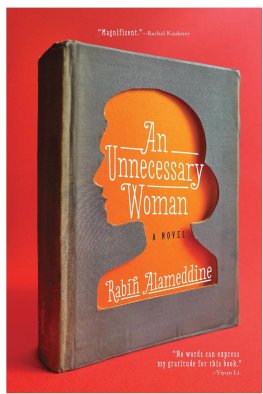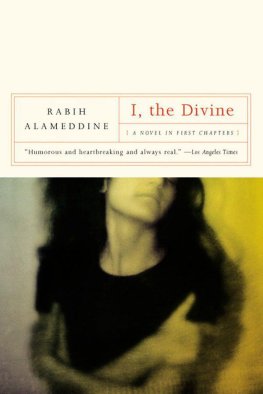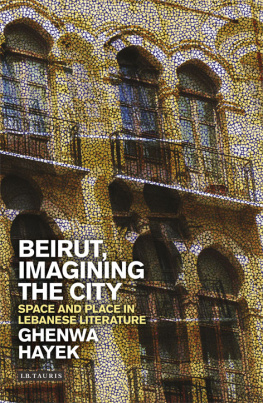Rabih Alameddine
The Hakawati
For Nicole Aragi
Demon Destroyer
Luscious Dove
Praise be to God, Who has so disposed matters that pleasant literary anecdotes may serve as an instrument for the polishing of wits and the cleansing of rust from our hearts.
Ahmad al-Tifashi, The Delights of Hearts
Everything can be told. Its just a matter of starting, one word follows another.
Javier Maras, A Heart So White
What Hells and Purgatories and Heavens I have inside of me! But who sees me do anything that disagrees with life me, so calm and peaceful?
Fernando Pessoa, The Book of Disquiet
Listen. Allow me to be your god. Let me take you on a journey beyond imagining. Let me tell you a story.
A long, long time ago, an emir lived in a distant land, in a beautiful city, a green city with many trees and exquisite gurgling fountains whose sound lulled the citizens to sleep at night. Now, the emir had everything, except for the one thing his heart desired, a son. He had wealth, earned and inherited. He had health and good teeth. He had status, charm, respect. His beautiful wife loved him. His clan looked up to him. He had a good pedicurist. Twenty years he had been married, twelve lovely girls, but no son. What to do?
He called his vizier. Wise vizier, he said, I need your help. My lovely wife has been unable to deliver me a son, as you know. Each of my twelve girls is more beautiful than the other. They have milk-white skin as smooth as the finest silk from China. The glistening pearls from the Arabian Gulf pale next to their eyes. The luster of their hair outshines the black dyes from the land of Sind. The oldest has seventeen poets singing her praises. My daughters have given me much pleasure, much to be proud of. Yet I yearn to see an offspring with a little penis run around my courtyard, a boy to carry my name and my honor, a future leader of our clan. I am at a loss. My wife says we should try once more, but I cannot put her through all this again for another girl. Tell me, what can I do to ensure a boy?
The vizier, for the thousandth upon thousandth time, suggested his master take a second wife. Before it is too late, my lord. It is obvious that your wife will not produce a boy. We must find someone who will. My liege is the only man within these borders who has only one wife.
The emir had rejected the suggestion countless times, and that day would be no different. He looked wistfully out onto his garden. I cannot marry another, my dear vizier. I am terribly in love with my wife. She can be ornery now and then, vain for sure, petulant and impetuous, silly at times, ill disposed toward the help, even malicious and malevolent when angry, but, still, she has always been the one for me.
Then produce a son with one of your slaves. Fatima the Egyptian would be an excellent candidate. Her hips are more than adequate; her breasts have been measured. A tremendous nominee, if I may say so myself.
But I have no wish to be with another.
Sarah offered her Egyptian slave to her husband to produce a boy. If it was good enough for our prophet, it can be good enough for us.
That night, in their bedroom, the emir and his wife discussed their problem. His wife agreed with the vizier. I know you want a son, she said, but I believe it has gone beyond your desires. The situation is dire. Our people talk. All wonder what will happen when you ascend to heaven. Who will lead our tribes? I believe some may wish to ask the question sooner.
I will kill them, the emir yelled. I will destroy them. Who dares question how I choose to live my life?
Settle down and be reasonable. You can have intercourse with Fatima until she conceives. She is pretty, available, and amenable. We can have our boy through her.
But I do not think I can.
His wife smiled as she stood. Worry not, husband. I will attend, and I will do that thing you enjoy. I will call Fatima and we can inform her of what we want. We will set an appointment for Wednesday night, a full moon.
When Fatima was told of their intentions, she did not hesitate. I am always at your service, she said. However, if the emir wishes to have a son with his own wife, there is another way. In my hometown of Alexandria, I know of a woman, Bast, whose powers are unmatched. She is directly descended, female line, from Ankhara herself, Cleopatras healer and keeper of the asps. If she is given a lock of my mistresss hair, she will be able to see why my mistress has not produced a boy and will give out the appropriate remedy. She never fails.
But that is astounding, the emir exclaimed. You are heaven-sent, my dear Fatima. We must fetch this healer right away.
Fatima shook her head. Oh, no, my lord. A healer can never leave her home. It is where her magic comes from. She would be helpless and useless if she were uprooted. A healer might travel, begin quests, but in the end, to come into her full powers, she can never stray too far from home. I can travel with a lock of my mistresss hair and return with the remedy.
Then go you must, the emirs wife said.
The emir added, And may God guide you and light your way.

I felt foreign to myself. Doubt, that blind mole, burrowed down my spine. I leaned back on the car, surveyed the neighborhood, felt the blood throb in the veins of my arms. I could hear a soft gurgling, but was unsure whether it came from a fountain or a broken water pipe. There was once, a long time ago, a filigreed marble fountain in the buildings lobby, but it had ceased to exist. Poof.
I was a tourist in a bizarre land. I was home.
There were not many people around. An old man sat dejectedly on a stool with a seat of interlocking softened twine. His white hair was naturally spiked, almost as if he had rested his hands on a static ball. He fit the place, one of the few neighborhoods in Beirut still war-torn.
This was our building, I told him, because I needed to say something. I nodded toward the lobby, cavernous, fountain-free, now perfectly open-air. I realized he wasnt looking at me but at my car, my fathers black BMW sedan.
The street had turned into a muddy pathway. The neighborhood was off the main roads. Few cars drove this street then; fewer now, it seemed. A cement mixer hobbled by. There were two buildings going up. The old ones were falling apart, with little hope of resuscitation.
My building looked abandoned. I knew it wasnt squatters and refugees had made it their home since we left during the early years of the civil war but I didnt see how anyone could live there now.
Listen. I lived here twenty-six years ago.
Across the street from our building, our old home, there used to be a large enclosed garden with a gate of intricate spears. It was no longer a garden, and it certainly wasnt gated anymore. Shards of metal, twisted rubble, strips of tile, and broken glass were scattered across piles of dirt. A giant white rhododendron bloomed in the middle of the debris. Two begonias, one white and the other red, flourished in front of a recently erected three-story. That building looked odd: no crater, no bullet holes, no tree growing out of it. The begonias, glorious begonias, seemed to burst from every branch, no unopened buds. Burgeoning life, but subdued color. The red the red was off. Paler than I would want. The reds of my Beirut, the home city I remember, were wilder, primary. The colors were better then, more vivid, more alive.
A Syrian laborer walked by, trying to steer clear of the puddles under his feet, and his eyes avoided mine. February 2003, more than twelve years since the civil war ended, yet construction still lagged in the neighborhood. Most of Beirut had been rebuilt, but this plot remained damaged and decrepit.












